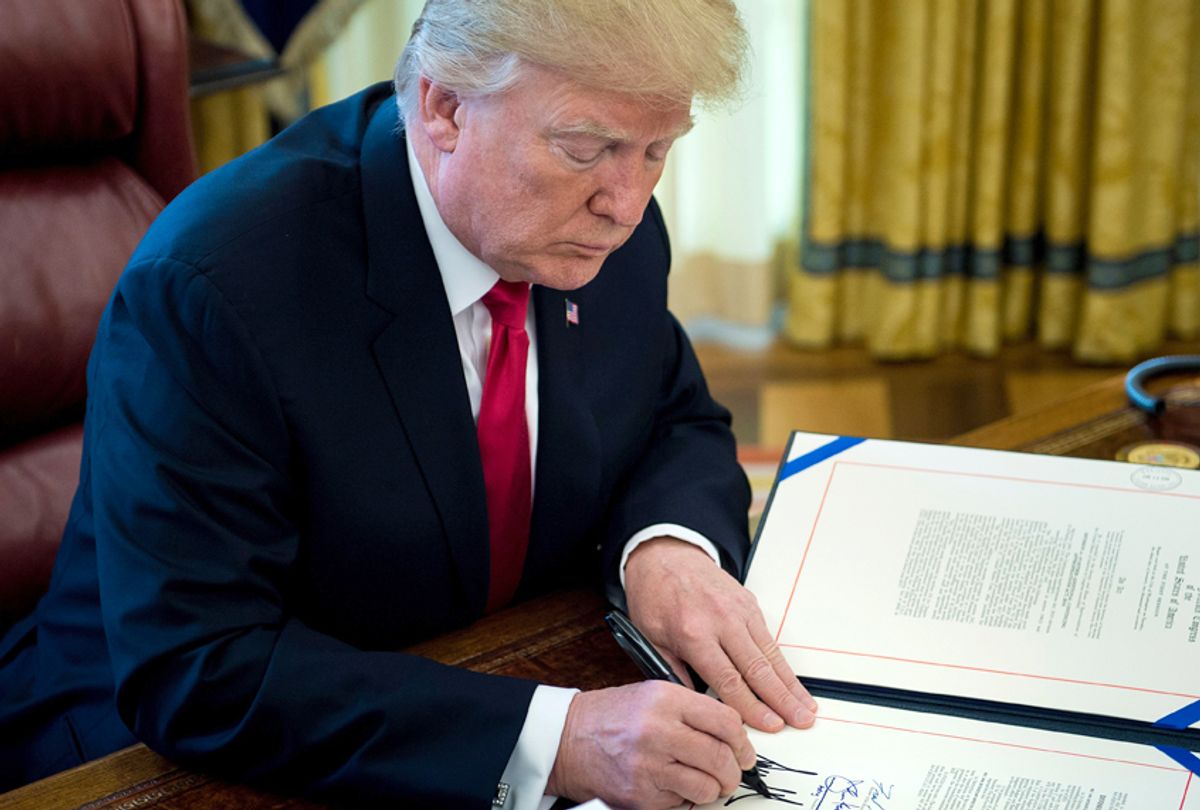President Donald Trump recently promised to spend "four or five days a week" out on the campaign trail for Republican candidates in the upcoming 2018 midterm elections, but it turns out that the GOP has other plans and may find the president's assistance to be more of a liability than anything else.
"He will be helpful in many, many places," Ohio Congressman Steve Stivers, the National Republican Congressional Committee chair said on Politico's "Off Message" podcast. "In almost every district, there are chunks of voters that he can be helpful with."
All told, however, poll numbers paint quite a contrasting picture, and Stivers failed to name a single battleground district he'd want to send Trump to.
Politico elaborated:
Asked to name one such district, Stivers pointed to the March 13 special election in the Pennsylvania 18th, a heavily Republican open seat outside of Pittsburgh, where Trump traveled this month for an event he said was to support the Republican candidate (though White House press secretary Sarah Huckabee Sanders later maintained that the taxpayer-funded trip was all official business).
The Pennsylvania district is heavily Republican, and while Democrats have started advertising there as the polling has tightened, they still consider the district, in which Republicans had an 11-point advantage in 2016, a long shot.
That’s as specific as Stivers would get.
Only 27 percent of registered voters believe Trump's support on the campaign trail would result in a positive impact, while 40 percent believe the president would have a negative impact, a new Morning Consult/Politico poll revealed.
"You know, I think we need to be smart about how and where we use everybody, every surrogate, whether it’s the president, vice president, you know, other members of Congress, other folks who want to help," Stivers explained. "We’re not going to give our battle plans to everybody, but we’re going to make sure we’re smart about the way we use folks."
While Stivers evidently did not want to elaborate much more on whether or not Trump could boost, or harm, the GOP's chances, he was quick to tout his confidence because of gerrymandering.
"I think it starts with the congressional lines," Stivers said. Asked bluntly if Republicans drew district lines to give themselves an advantage in elections, Stivers replied, "You can say that, but the people elected them."
But several Republicans up for reelection in 2018 are either not looking to discuss the prospect of bringing Trump on the campaign with them, or they are essentially opposed.
Per Politico:
Rep. John Faso, from the Hudson Valley of New York, punted questions to an aide who said he was too busy to talk, then didn’t respond to questions about Trump.
An aide to south Florida Rep. Carlos Curbelo said he also happened to be too busy to discuss Trump, but pointed out that the congressman has appeared with Trump and with Barack Obama previously. Curbelo doesn’t invite politicians to campaign with him, but anyone who wants to support “his bipartisan approach to public service is welcome to do so,” the aide said.
Young Kim, the congressional candidate Ed Royce (R-Calif.) endorsed for the seat he ducked out of trying to defend, said she hadn’t considered the possibility that Trump might campaign for her.
While the party certainly doesn't seem positioned to abandon Trump anytime soon, it seems that some Republicans have come to terms with the idea that the president's presence could be a liability in contentious districts as a potential Democratic wave approaches.



Shares